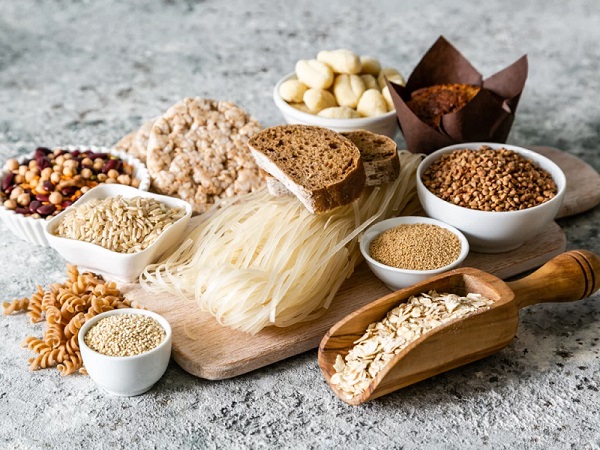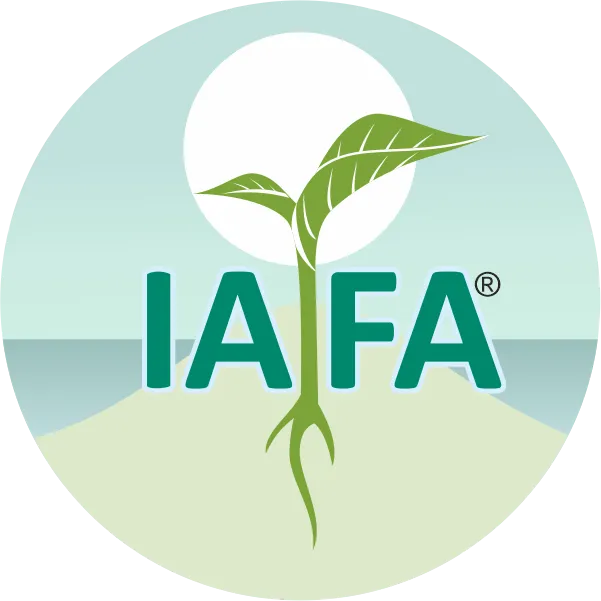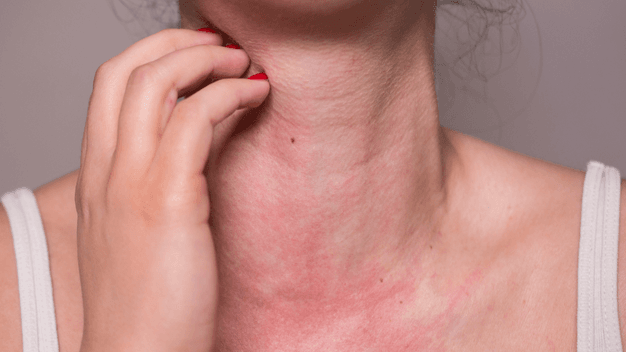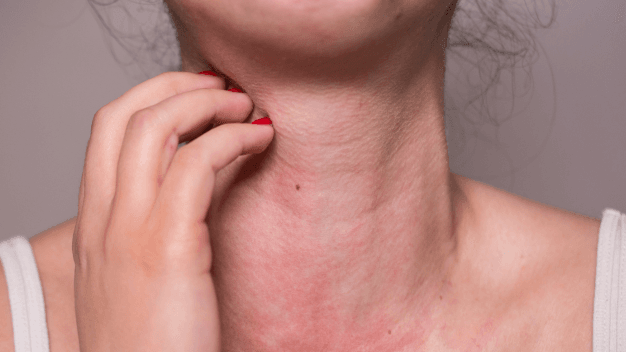On This Page
Wheat and Gluten Allergy – Causes, Symptoms, and Ayurvedic Treatment
……………ग्रहणीगद:। तस्य स्याद्गनि विध्वंसकरैरत्यर्थ सेवितै:॥
An allergy is a hypersensitive reaction of the body when comes into contact with a substance that is in fact harmless. An allergy occurs suddenly and is predictable. The hypersensitive response comes from the natural immune system and ranges from a slightly uncomfortable feeling to a fatal anaphylaxis. The substances in your environment that cause allergies, are referred to as allergens. The most common allergens are dust, Pollen, food proteins, certain medications, cosmetics, latex, etc. and skin contact with allergens cause skin allergy.
There are 4 types of allergens – namely Albumins, Globulins, Prolamines, Glutelins. Within wheat, prolamins are called gliadins and glutelins are called glutenins. These two protein groups form the classic glutens. Gluten is a causative agent of Coeliac disease (CD), and can be contrasted to gluten allergy by the involvement of different immune cells and antibody types. Wheat allergy is an auto-immune disease which causes reaction to proteins (especially gluten) found in wheat. The immune system of a person having wheat allergy develops a specific antibody, a disease-fighting agent, to the wheat protein. Other factors which are responsible for the ailment are environmental and genetic factors.
Even though there are some major differences between the three main types of negative food responses (spec. allergy, sensitivity and intolerance), in Ayurveda all comes under Asatmaya (intolerance) and basic root cause lies in Agni. According to Ayurveda, this can correlated with Grahani roga (Sprue) in Ayurveda. Agnimandya (low digestive fire) results in formation of Aama (undigested food) and the disease manifests.
Causes of Wheat and Gluten allergy
It is caused by an abnormal immune system reaction to the protein gluten, which is mostly seen in foods such as bread, pasta, cereals and biscuits. It is an autoimmune condition, in which the immune system mistakes healthy cells and substances for harmful ones and produces antibodies against them (antibodies usually fight off bacteria and viruses). Some gene variations appear to increase the risk of developing the disease.
Symptoms of Wheat and Gluten allergy
The most common signs for adults are:-
- Diarrhea
- Fatigue
- Weight loss
- Bloating and gas
- Abdominal pain
- Nausea
- Constipation
- Vomiting.
Other signs include:-
- Mouth ulcers
- Headaches and fatigue
- Joint pain
- Reduced functioning of the spleen (Hyposplenism)
- Acid reflux and heartburn
- Anemia, usually resulting from iron deficiency
- Loss of bone density (osteoporosis) or softening of bone (Osteomalacia)
- Itchy, blistery skin rash
As per Ayurveda, the symptoms include:-
- Muhu Baddha and Drava Mala Pravritti (either constipation or loose stools)
- Apachana (indigestion)
- Aruchi (anorexia)
- Udara Shoola (abdominal pain)
- Udara Gaurava (heaviness of abdomen)
Ayurvedic Reference of Wheat And Gluten Allergy – Grahani roga
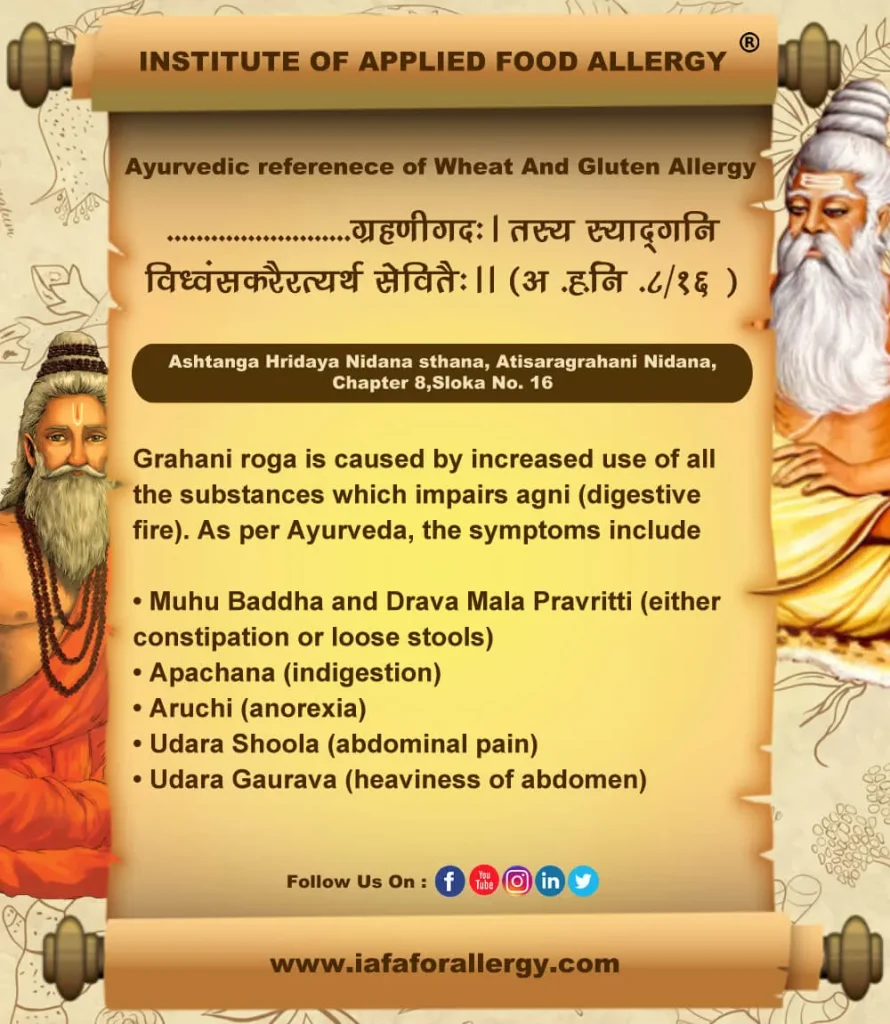

“Dr. Gupta’s IAFA provides efficient treatment for Wheat and Gluten allergy through a very thorough approach by assessing the specific condition of the patient. Institute of Applied Food Allergy® is the most reliable institute for the management of various allergic manifestations. You will be provided the best Ayurvedic management for Gluten allergy in IAFA.
Dr. Gupta’s IAFA is here to protect you always from all allergies.
– Dr. Sahil Gupta (B.A.M.S., M.H.A.)
Ayurvedic Allergy Specialist
CEO & Founder of IAFA®
At last, Easier Wheat and Gluten allergy Management

Trusted by
More than 90,000 Patients

Convenient
at-Home Treatments

9.2 / 10
Customer Satisfaction Score
Ayurvedic Treatment for Wheat and Gluten Allergy
Primary treatment should be planned such that the Agni (digestive fire) of the patient increases. Ayurvedic diet and lifestyle play a significant role in managing the symptoms and treating the disease. Ayurvedic treatment corrects the immune system, calming down the gut brain, the digestive disturbance, improving the absorption of nutrients from the food through yoga, lifestyle recommendations, Panchakarma therapy and internal medication.
Internal Medicines for Wheat and Gluten Allergy
- Triphala Churna
- Dadimashtaka churna
- Shivakshara Churna
- Trikatu Churna
- Hingvadi Vati
- Kutaja ghana vati
- Chitrakadi Vati
- Guduchi satva
- Dadimadi ghritham
- Guluchyadi Kashaya
- Drakshadi Kashaya
- Pravala panchamrita
External Medicines for Wheat and Gluten Allergy
- Haridra (Curcuma longa)
- Tulasi (Ocimum sanctum)
External therapies for Wheat and Gluten Allergy
- Enema Therapy (using milk and medicated drugs)
- Lepa((Application of medicines on body)
Single Herbs Used in Wheat and Gluten allergy – As Per Ayurveda
- Kutaja ( Holarrhena Antidysenterica)
- Bilwa (Aegle marmelos)
- Musta (Cyperus rotundus)
- Pippalimoola (Piper longum)
- Chavya (Piper chaba)
- Pippali (Piper longum)
- Chitraka (Plumbago zeylanica)
- Sunthi (Zingiber officinale)
- Amlavetasa (Garcinia pedunculata)
- Maricha (Piper nigrum)
- Haridra(Curcuma longa)
Diet Management in Wheat and Gluten Allergy
Do’s (Pathya) in Wheat and Gluten allergy
- Take a green food supplement once a day
- Include yoghurt, buttermilk, juices, pulses and fruits in diet
- Include old rice, buckwheat, ragi, whole corn, millets and gluten free oats.
- Include ginger, coriander leaves, lentil, green gram soup, black pepper, nutmeg and skimmed milk in diet.
- Include herbs like ginger, fennel and cumin that will stimulate digestive enzyme secretions which will further improve digestion, absorption and clear away the accumulated toxins out of the body.
- Drink freshly prepared well-churned buttermilk spiced with cumin, ginger and curry leaves regularly. This will improve your agni as well as enhance absorption also
Don’ts (Apathya) in Wheat and Gluten allergy
- Avoid all food items that contain gluten like those made from wheat, rye, oats and barley.
- Avoid processed foods that contain gluten.
- Avoid bread crumbs, soya sauce, vegetable starch, natural flavouring.
- Avoid tea, coffee and caffeine as they can stimulate the intestines and cause diarrhoea.
Yoga Therapy for Wheat and Gluten Allergy
Yoga therapy is extremely beneficial to treat Wheat and Gluten allergy since there is an underlying psychological component in many of the intestinal diseases. Yogasanas and pranayama are more beneficial to the patients.
Postures include:-
- Balasana (child’s pose)
- Parivrtta Trikonasana (revolved Triangle Pose)
- Setu Bhanda Sarvangasana (Bridge Pose)
- Supta Matsyendrasana (Supine twist
- Ardha Pawamuktasana (Half Wind Release Pose)
When there is extreme fatigue, pranayama is effective

Frequently Asked Questions
Question: What is Wheat and Gluten allergy?
Answer: Wheat and Gluten allergy is a condition in which the small intestine is hypersensitive to gluten, leading to difficulty in digesting food.
Question: What are the causes of Wheat and Gluten allergy?
Answer: It is caused by an abnormal immune system reaction to the protein gluten, which is found in foods such as bread, pasta, cereals and biscuits.
Question: What is the Ayurvedic treatment for Wheat and Gluten allergy?
Answer: Ayurvedic treatment for Wheat and Gluten allergy mainly aims correcting the digestive fire and therby the doshas and enhancing the power of immune system.
Question: What foods contain gluten?
Answer: Gluten is found in food products that are prepared from wheat such as: barley, bread, pasta etc.
Question: Does Ayurveda recommend to just avoid wheat to the patients of Wheat Allergy?
Answer: People with Wheat Allergy should avoid the consumption of wheat for sometime but then slowly include these foods back into your diet.
Question: Can Ayurveda treat wheat allergy?
Answer: The concept of wheat allergy in Ayurveda is entirely different from modern system of medicine. Ayurveda can treat wheat allergy successfully without its recurrence by stimulating the digestive system and correcting the impaired digestive system.
Dr. Gupta’s IAFA is the most reliable institute for the management of various allergic manifestations. You will be provided the best Ayurvedic management for Gluten allergy in IAFA.
Dr. Gupta’s IAFA is here to protect you always from all allergies!!
Was this Page Helpful?
So IAFA Root-Cause Treatment of Your Wheat & Gluten Allergy is Just 3 Steps Away!

01. Connect With Us
Share your history of illness or Book your appointment

02. Consult With Us
Dr. Gupta a certified Ayurvedic Allergist Consultant

03. Root Cause Treatment
Get an accurate diagnosis, medicines, diet & lifestyle change
Wheat & Gluten Allergy – Case Studies
Real Case Studies of Successfully Treated Patients from All Around the World by IAFA Ayurveda®

5-Year-Old Shih Apso Dog Recovered from Canine Peripheral Neuropathy – A Case Study
This case study presents a 5-year-old Shih Tzu-Lhasa Apso crossbreed dog (pet)…

9 Year Old Female Patient Recovered from Chronic Allergic Bronchitis – A Case Study
This case study presents a 9-year-old female patient who has successfully recovered…

12-Year-Old Child Recovered from Sun Allergy and Polymorphous Light Eruption (PMLE) – A Case Study
This is a case study of a 12-year-old child who has successfully…

40-Year-Old Female Patient Recovered from Dyshidrotic Eczema and Onychomycosis – A Case Study
This case study highlights the successful recovery of a 40-year-old female patient…
Read More Articles

Polymorphous Light Eruption (PMLE)
Discover Ayurvedic treatment for Polymorphous Light Eruption (PMLE). Learn about its causes,…

Mast Cell Diseases
Discover Ayurvedic treatment for Mast Cell Diseases, including types, causes, symptoms, and…

High Immunoglobulin-E (IgE) Levels
Discover Ayurvedic treatment for high Immunoglobulin-E (IgE) levels. Learn about the causes,…

